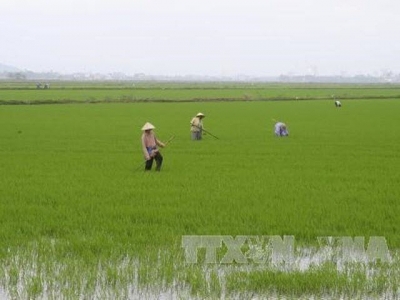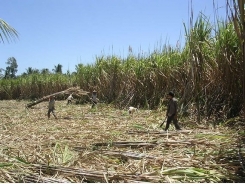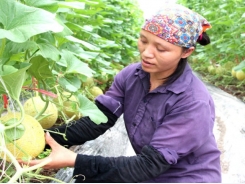Sustainable agriculture project raises farmers profits by 14 per cent

Farmers in the Mekong Delta have earned higher profit as a result of the Việt Nam- Sustainable Agriculture Transformation Project.—VNA/VNS Photo
CẦN THƠ—The Việt Nam-Sustainable Agriculture Transformation Project (VnSAT) in the Mekong Delta has helped raise farm profits by 14 per cent after two years of implementation, according to Đặng Minh Cường, the project’s deputy head.
Speaking at a recent conference held in Cần Thơ City by the Ministry of Agriculture and Rural Development, Cường said the project had helped profits rise from VNĐ33.1 million (US$1,464) per ha to VNĐ37.1 million ($1,627) per ha.
Many companies have provided guaranteed outlets for 23,000 of the total 50,000 ha covered by the project.
Last year, more than 60,000 farmers have taken part in the VnSAT project and were trained in sustainable rice cultivation.
Forty-four farmers unions, associations and other farmer groups in the Mekong Delta region were given a total of $13.5 million in funds from the World Bank to buy equipment, materials, and other items.
However, Nguyễn Thanh Hùng, vice chairman of Đồng Tháp Province’s People’s Committee, said many farmers had not applied the cultivation and production techniques that had learned during the project.
Hùng said the project staff should try to raise this figure and encourage use of advanced machines.
The province is working with a company specialising in providing these machines such as a three-in-one machines that harvest, fertilise crops and sprays permitted chemicals on fields.
Through these machines, they have been able to reduce the quantity of rice variety from 70 kilogrammes to 80 kilogrammes per ha, compared to the targeted number of 30 to 40 kilogrammes, he added.
Deputy Minister of Agriculture and Rural Development Lê Quốc Doanh said he agreed with the World Bank’s suggestion mechanise rice production.
From 2018 to 2020, regional authorities should focus on reaching the project targets so the Government can achieve results in its agricultural restructuring programme.
VnSAT began in December in 2015 in seven provinces: An Giang, Đồng Tháp, Hậu Giang, Kiên Giang, Long An, Sóc Trăng and Tiền Giang, as well as Cần Thơ City, and the five Central Highlands provinces of Đắk Lắk, Đắk Nông, Gia Lai, Kon Tum and Lâm Đồng.
The project is expected to help increase the number of agricultural products with export value worth more than $1 billion, including rice, coffee, pepper, rubber, cashews, wood, fruit, tra fish, shrimp, and cassava.
With total capital of $301 million provided by the World Bank, the Vietnamese government and the private sector, the project aims to use advanced technologies in rice production on 200,000 ha for 140,000 farmers, raising profits by 30 per cent per ha.
It is estimated that the total added value for the entire region will be $60 million per ha.
In the Central Highlands region, the VnSAT project provided advanced technologies to 63,000 farmers for use on 69,000 ha.
The total added value is expected to be around $48 million to $50 million for each year from 2015 to 2020.
This year, VnSAT continued to offer training techniques in cultivation and production for farmers.
Their organisational staff of VnSAT will also be trained in administration, screening and evaluation methods.
Related news
Tools

Phối trộn thức ăn chăn nuôi

Pha dung dịch thủy canh

Định mức cho tôm ăn

Phối trộn phân bón NPK

Xác định tỷ lệ tôm sống

Chuyển đổi đơn vị phân bón

Xác định công suất sục khí

Chuyển đổi đơn vị tôm

Tính diện tích nhà kính

Tính thể tích ao



 Cần Thơ to build 700ha specialised fruit farm
Cần Thơ to build 700ha specialised fruit farm  Coffee export volumes jump, value falls in Q1
Coffee export volumes jump, value falls in Q1